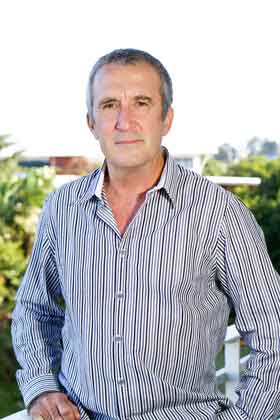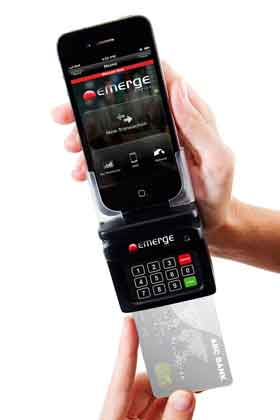
Emerge Mobile, an ambitious start-up based in Umhlanga, north of Durban, has developed a smartphone-based mobile payments system similar to the US solution Square, and has secured certifications from international bodies. It now plans to launch the product in Africa and other emerging markets.
Emerge Mobile was founded by the father and son team of Clive Putman (who is technology director) and Matt Putman (MD), along with Ramsay Daly (marketing director), with whom Matt went to school at the exclusive Hilton College in KwaZulu-Natal.
The Emerge Mobile solution is the second such payment system being developed by a South African start-up. Thumbzup, founded by well-known technology entrepreneur Stafford Masie, is also working to launch a smartphone-based payments system in collaboration with banking group Absa.

“Ramsay and I came across an article on Square and its founder Jack Dorsey in Fortune magazine, and we realised it was a good concept,” Matt Putman says. The pair contacted Square, hoping to represent the company in South Africa, but were told that the US start-up had no immediate plans to expand into Africa.
Instead, they decided — perhaps not realising the scale of what they were taking on — to develop a Square-type product of their own. Clive Putman had a strong background in IT, especially in hardware development and cryptography. “We realised the Square concept would have legs in South Africa and Africa and slowly, piece by piece, we started to put it all together,” says Matt.
The founders, with a small team of engineers based in Durban, began work on a prototype at Clive’s house in Umhlanga. Through a friend of Matt’s, Bevan Ducasse of the Cape Town-based wiGroup, the young start-up secured a first round of funding from Capital Eye Investments, a private equity business that had emerged from the formerly listed UCS Group, some of whose assets have now been sold to IT services company Business Connexion.
“We weren’t looking to raise hundreds of millions in the first round. It was important for us as founders to retain majority control, so we worked on tight budgets with three or four engineers to start with, who worked under Clive’s supervision,” says Matt. “We sent them overseas to find out what sort of security was needed, how the cryptography had to be structured, and so on. After that, we built out the design of the model we eventually got through the labs.”

The biggest learning curve, he says, was understanding the difference between the legacy magnetic stripe technology employed by Square — chip cards are not common in the US — and the chip-and-Pin systems used in many other markets, including South Africa.
“We didn’t just want to build a piece of hardware,” says Matt. “We wanted to build a whole platform and take a brand to market in South Africa, building all the components we needed to, and then finding a bank to give us an aggregator relationship.”
That turned out to be harder than expected. Local banks told the start-up that they wanted to control the technology and the process, so the team decided instead to “white-label” the platform and act more as a technology services platform provider to help banks, especially in other emerging markets. The company is confident of signing its first white-label deal soon.
“Our focus now is to launch our own brand in South Africa, our own consumer-facing business that is very different to Emerge Mobile,” Matt says. The consumer brand will be launched in pilot within the next few months. “Ramsay is driving the marketing and support team from Cape Town, while I’m working on white-label opportunities for banks in other markets from our Umhlanga head office.”
The company is launching with two mobile point-of-sale (M-POS) solutions, one for Apple’s iPhone and the other for Android-based devices. The iPhone M-POS terminal uses Apple’s proprietary connector, while the Android solution communicates using the audio jack on smartphones.
A BlackBerry version may be launched, depending on future demand for the platform. Windows Phone is also a possibility, though not a priority for now.
The devices will be assembled locally, with some specialised components imported from Germany and the US, with other parts sourced in South Africa. The company hopes to sell the product for less than US$100. “Everything is assembled and tested in Durban.”

The iPhone and Android apps will allow merchants who own the M-POS terminals to offer value-added services in addition to accepting card payments from customers. For example, they’ll be able to sell cellular airtime and other prepaid services, says Matt.
The solution can accept and process payments from third-party mobile wallets and allows the redemption of mobile vouchers and coupons.
Merchants will also have access to business analytics software in the app. Support will be offered through a call centre and through social media tools such as Facebook and Twitter.
“We have to have a standout product where the customer or merchant feels we’re doing stuff for them that’s really cool.”
Earlier this week, Emerge Mobile announced that it had achieved Payments Council International Payment Terminal Security (PCI-PTS) and Europay, MasterCard and Visa (EMV) Level 1 and 2 certifications for its product.
They say this is the first time that a fully South African designed, engineered and manufactured end-to-end M-POS solution has attained this level of international security certification. It means that the product is compliant with the rules set by the global card schemes and legislated financial institutions, says Matt.
Emerge Mobile is now talking to banks in Africa, as well as mobile telecommunications operators. “We want to find a big strategic international partner or investor at some point to help us aggressively take the business to the rest of Africa and other emerging markets — Eastern Europe, Latin America and India — but we want to demonstrate traction first.” — (c) 2014 NewsCentral Media




